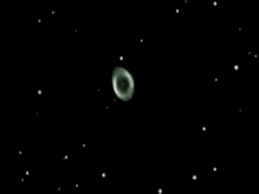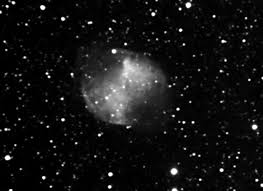June 23, 2009
Trip to Tierra del Sol with Tom Youngholm.
Warm, seeing was 3/5 from the Clear Sky Clock. Equipment worked well, got dewed at around 12:30am. I'm pretty sure I've been dark with the big scope (N11) at least twice, once to TDS and once to the Yent's ranch, but possibly no more than that.
I know experienced observers frown on folks who just slew from one object to another, but I hadn't been out in a dark site in forever and I had a guest...
My primary target goals for the night were the Omega Cluster, the Hercules Cluster, the Whirlpool Galaxy, the Sombrero Galaxy and Titan entering Saturn's shadow.
We arrived, as usual, fifteen minutes later than I prefer, but always winds up being good timing. I hadn't expected anyone there on a Tuesday, but there were a couple of guys, Richard and Art set up on the pads, a shed's roof was open, and a Michael wandered by before doing some astrophotography at his private pad.
Set up went smooth, managed to see the thin crescent moon (1-day?) prior to it settling into the murk. Next up was Saturn. Didn't linger since we expected to be back to it later during the shadow ingress.
The Omega Cluster is only visible in the evening for short periods, so I wanted to see that. I'd only seen it once or twice before. At first it was too bright to resolve, but later views were pretty awesome.
| The shot to the right is a pretty good representation of what it looks like through the eyepiece: uniform grey dense fine granulates. Massive! Uniform in color (due to low declination) and very 2D. |  |
| For contrast we went over to the Hercules Cluster. Though smaller it's high in the sky so appears much brighter. It's one of my favorite sights. Less stars but brighter, with clumping, some variation in star brightness and color, with a definite 3D look even without binoviewers (then it's really 3D). |  |
Now we're getting to the part where astronomy requires imagination. Click on the links to get the amazing astrophotographs. I tried to doctor the photos below to look similar to how the object looks in the eyepiece (generally by lowering the brightness and contrast).
| I'd seen the Sombero Galaxy once in the dark and once from the back patio, but tonight it was pretty good. The shot to the right is pretty close to how it looked. |  |
| I'd seen the Whirlpool Galaxy once very well (I was very moved: I felt like a man). Tonight was good, but I couldn't actually see the arm between the main and the satellite core like I did that one time. Definitely something structured around the main core, but arms were not distinct. |  |
| After that it was pretty much scrolling through the Telescopes "Tour" function. We saw another globular, the Trifid Nebula (vague, dim, but with the dark lanes defining the "tri"), the Lagoon Nebula (way dim), the Swan Nebula (to the right) which is pretty bright and well-defined. |  |
| We swang to M81 and M82, which is always nice because you can see both in the same eyepiece field of view. One's an edge-on spiral, the other is a face-on spiral. Sure, one's a round blob and the other is a skinny blob. But each blob is 100 billion stars. |  |
| Went over to the Leo Triplets. Again, just smudges, but three of them and 100 billion stars each. They were brighter than I'd ever seen them. While Tom was watching a satellite passed through the field of view. |  |
Had some coffee in the warming hut (yum). And the basically just went all over. Saw some planetary nebula including the Eskimo and Cat's Eye, which weren't that interesting.
The Ring Nebula looked like a ring 
and the Dumbbell Nebula looked big by comparison  .
.
I looked at the Blackeye Galaxy and the Sunflower Galaxy, but they didn't resolve much other than core fuzz. We did slew over to somewhere in the Virgo galaxy cluster, where there were two galaxies in the field of view, but when you slewed up you could see two more. Four galaxies right next to each other.
When Jupiter rose I was getting dewed and it was late, so we packed up.